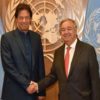
They’ve been detained in a government raid on unlicensed plastic recyclers as the country seeks to curb a growing illicit industry.
“It’s illegal,” said Yeo Bee Yin, Malaysia’s Minister of Energy, Science, Technology, Environment and Climate Change, who attended the raid and had invited journalists to watch.
“It’s against the Environmental Quality Act because they do not have licenses and they are polluting.”
Malaysia is cracking down on opportunists who are trying to cash-in on China’s decision last year to ban plastic waste imports. Since July 2018, officials have shut down at least 148 unlicensed plastic recycling factories — but have only pressed charges against a handful of suspects.
Much of the waste comes from countries outside Malaysia, including the US, which angers Yeo who says wealthy nations shouldn’t be using her country as a trash dump.
“I will take care of my own rubbish,” she says. “You should take care of yours.”
‘No magical land of recycling’
The rise of illegal recyclers in Malaysia, and elsewhere in Southeast Asia, has exposed the rotten side of an industry that experts say is often anything but “green.”
“There’s no magical land of recycling with rainbows and unicorns. It’s much grittier than that,” says Martin Bourque, executive director at the Ecology Center in Berkeley, California, a non-profit group that has been engaged in curbside recycling programs since 1973.
At the center’s plant, laborers wearing protective aprons and work gloves sort through a grimy procession of metal and glass refuse that clatters along a conveyor belt.
Bourque says the recycling of paper, tin, and aluminum “saves a ton of energy and natural resources.”
But approximately 40% of the non-bottle mixed plastic that his organization gathers is not recycled — either because it’s made from plastics that are too costly or hard to process, have been contaminated with food or other materials, or there simply isn’t a market for that type of plastic.
Therefore, this plastic goes directly to landfill. Bourque says that’s because he cannot find a destination that can recycle the plastic without causing additional harm to the environment.
“We would much rather see them in a landfill then being exported to a foreign country where we don’t know what the final destination will be,” Bourque explains.
Once unrecycled plastic scrap leaves the facility it becomes an internationally-traded commodity that normally goes through different hands en route from the point of origin to final destination, making it hard to track.
To ensure its plastic was being properly recycled, the Berkeley facility carried out an experiment. Using a GPS locator to track plastic waste, they learned that their shipments ended up in China and Malaysia.
There, Bourque says, local environmental investigators found signs of plastic dumped in ravines and waterways. For the plastic that did reach a recycling factory, there were reports of poor working conditions and contaminated water being discharged into local creeks from such facilities.
“We think it’s a real problem that mixed plastics from recycling programs could end up being dumped in the environment in (developing) countries,” Bourque says.
Plastic scrap — an international commodity
For the past quarter century, much of the plastic scrap collected in the US was shipped to China for recycling. Experts say China’s booming manufacturing industry was hungry for raw material.
“China was absolutely willing to accept those materials and paid a very high price for them,” says Bourque. This created little incentive for entrepreneurs to invest in labor-intensive plants to process plastic in the developed world, he adds.
A huge mount of unrecycled plastic that has been dumped in Malaysia.
That practice, however, came to an abrupt end in January 2018, when China announced a ban on the import of plastic waste as part of an initiative to clean up its environment.
The move caused a ripple effect through global supply chains, as middle men sought new destinations for tons of plastic waste.
Malaysia quickly became one of those spots.
According to a recent Greenpeace report, during the first seven months of 2018, plastic waste exported from the US to Malaysia more than doubled compared to the previous year.
And the US wasn’t alone. Other top exporters of plastic scrap to Malaysia include Japan, the United Kingdom, Germany and Hong Kong, according to the Malaysian government.
Illegal recyclers
The surge of plastic imports to Malaysia appears to have encouraged unlicensed recyclers to set up across the countryside, to deal with the extra capacity in the industry.
Early last year, Lay Peng Pua says she started smelling acrid fumes around her home in the rural town of Jenjarom.
“I felt something wrong with the air but I didn’t know where it came from,” she says.
Lay and other locals mobilized to find the source of the fumes. To their horror, they discovered that recycling shops that had sprung up nearby were burning large amounts of plastic, which could not easily be processed and re-sold.
Different types of plastic have different value. Some unregulated operators buy mixed plastic in bulk, and find it cheaper to illegally burn or dump less valuable material than to process it in a way that causes less harm to the environment.
On the edge of town, towering piles of abandoned plastic scrap can still be seen in a partially burned-out warehouse. The factory operators appear to have fled. A district council spokesperson says an offense notice has been issued to the property owner, who claims not to have known that the renters ran a recycling plant.
Some of the tons of plastic at the site appears to come from overseas — there’s a wrapper for Poland Spring bottled water from Stamford, Connecticut, a bottle of Palmer’s Cocoa Butter Formula manufactured in Englewood Cliffs, New Jersey, and a bag of Metcalfe’s Skinny Popcorn packaged in the United Kingdom.
While Lay’s team claims to have found more than 40 illegal factories from February to July 2018, critics argue that the penalties they face are a weak deterrent. Only six people have been charged with running illegal recycling operations, according to government figures. Of those, one was sentenced — to a single day in jail.
Environment minister Yeo, however, believes the blame doesn’t just lie with her country: “Ask your government, ask the waste management companies, where does this plastic you diligently separated end up?”
Plastic ‘gold’
Malaysia does have licensed plastic recyclers. One example is C-Square International Trading, located in an industrial park in the Malaysian port town of Klang, near Kuala Lumpur.
Giant bales of grubby, used plastic bags — some imprinted with the slogan “Walmart-Save money. Live better” — are stacked 15-feet high in the facility.
“That’s gold to me!” says Choon Boon Ng, founder of the pilot recycling plant.
Malaysian-American Ng says his company recycles plastic waste from Walmart stores in several mid-western US states.
Plastic bags at the facility are fed into a series of machines that wash, crush and slice the plastic into small flakes, which are blown out of a “Cyclone” machine into a white tornado that looks like a snow storm.
The flakes are collected, melted and discharged as a scalding hot, gray paste, which oozes out of a machine like giant toothpaste. That substance then goes through a grate which turns the it into small pellets.
Ng says one-ton sacks of these pellets sell at the equivalent of $850 a piece, generating a considerable profit. Everything from children’s toys to shoe soles can be made from that material, he says.
“You’re actually giving it a new life,” Ng says. “This is what I love about recycling.”
CC Cheah, vice-president of the Malaysian Plastics Manufacturers Association, which has 90 legal plastics recyclers among its 750 members, says Malaysia needs more well-sorted plastic to fuel its industry.
“What is being collected here [in Malaysia] is not enough to support the local recycling industry,” he says. “Therefore, we have to resort to importing plastic scraps from other countries.”
Malaysia says enough
Amid growing complaints about illegal recyclers, in October 2018 the Malaysian government imposed a temporary ban on the import of most plastic scrap, which has also impacted the country’s licensed plastics recyclers.
“The local recycling companies in Malaysia that are following the rules and doing proper recycling are suffering,” says CC Cheah.
Over the past year, other southeast Asian countries such as Thailand, Vietnam and India have also reportedly taken steps to restrict the import of foreign plastic waste. This has left containers of plastic sitting in US ports waiting for a destination.
This abandoned illegal recycling factory is still home to piles of plastic.
Bourque, of the Berkeley’s Ecology Center, says it is important that the bans on plastic waste due to illegal operators don’t send the wrong message and stop Americans from recycling.
But equally, he warns that consumers will ultimately need to find alternatives to single-use plastic packaging.
Otherwise, he says, we may all one day end up drowning in all this plastic.
Back in Malaysia, Lay has a very simple message for the West.
“The countries that send their rubbish to my country, please stop!” Lay says. “Try to manage your own waste in your own country on your own land.”
Credit: Source link















